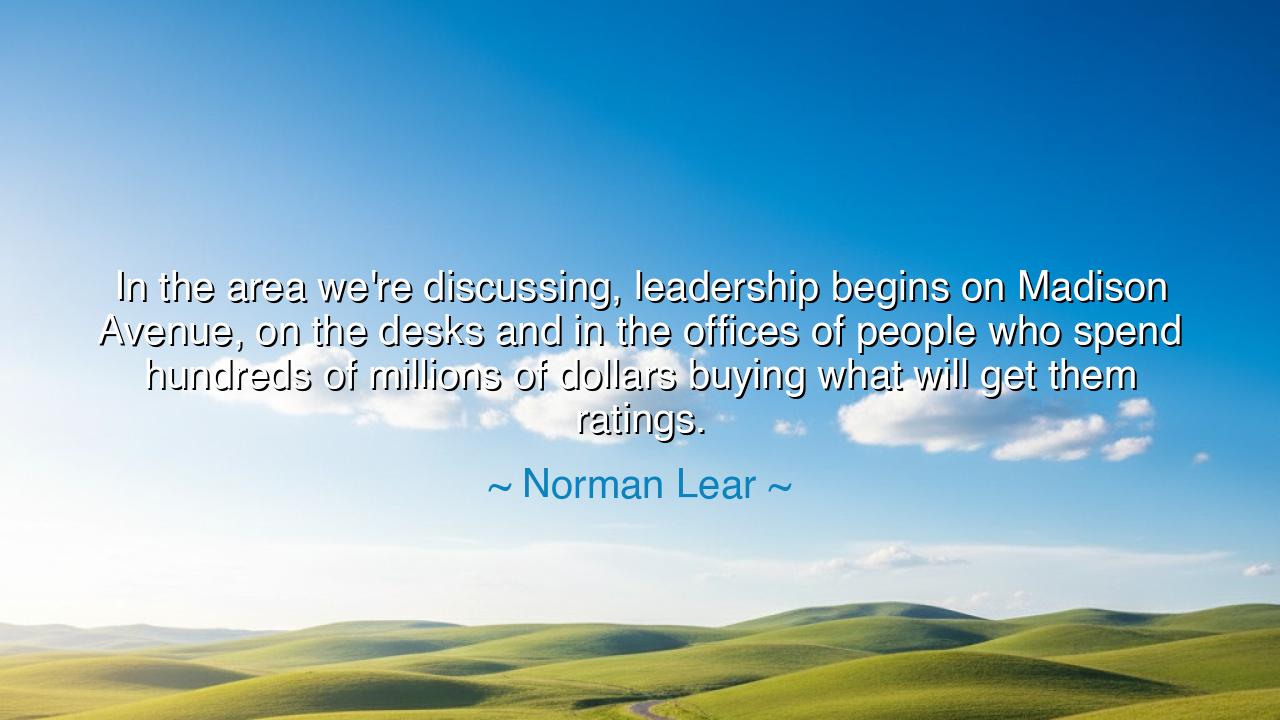
In the area we're discussing, leadership begins on Madison
In the area we're discussing, leadership begins on Madison Avenue, on the desks and in the offices of people who spend hundreds of millions of dollars buying what will get them ratings.






When Norman Lear declared, “In the area we’re discussing, leadership begins on Madison Avenue, on the desks and in the offices of people who spend hundreds of millions of dollars buying what will get them ratings,” he spoke not only of television and commerce, but of power disguised as persuasion. Beneath his words lies a profound truth about the modern age: that in a world ruled by images and consumption, leadership has shifted from the realm of statesmen and philosophers to the realm of advertisers and media moguls. His observation is not cynical, but prophetic — a reminder that in the age of screens, those who control attention shape the conscience of nations.
The origin of this quote lies in Lear’s long experience as one of the most influential figures in American television. As the creator of groundbreaking shows such as All in the Family and The Jeffersons, Lear knew firsthand how the entertainment industry wielded its power — not just to amuse, but to mold public perception. “Madison Avenue” — that famous stretch of New York City synonymous with advertising — becomes in his words a metaphor for the invisible throne from which modern influence flows. Those who decide what images the world sees, what slogans it repeats, what emotions it consumes, have become, in a sense, the new architects of belief.
In the style of the ancients, we might say that Lear was lamenting the decline of the philosopher-kings and the rise of the merchant-priests — those who do not lead through virtue or vision, but through market research and manipulation. Where once the voices of prophets and thinkers guided the moral compass of civilization, now the flicker of the television screen and the allure of branding command the masses. It is not kings but advertisers who shape the myths of our time. They do not ask, “What is good?” but rather, “What sells?” And in that subtle shift, the destiny of a culture begins to turn from wisdom to appetite.
Consider the story of ancient Rome, a civilization that once prized discipline, virtue, and civic duty. As its empire grew rich, it fell captive to spectacle. The gladiator games, the grand feasts, the theater of decadence — all became tools to distract the populace, to keep them docile and entertained. The poet Juvenal described this with biting clarity: panem et circenses — “bread and circuses.” So too, Lear’s warning to modern America echoes this ancient lament. The new circuses are televised, the bread replaced with the endless buffet of entertainment, and the emperors have become advertisers, governing not through decree, but through desire.
Yet Lear’s message is not purely one of despair. Within his insight is the recognition that if leadership now begins on Madison Avenue, then responsibility must also begin there. The creators, producers, and advertisers — those who hold the power to shape minds — bear a sacred trust. If their choices can dull the conscience of a society, they can also awaken it. Lear himself proved this through his art. By using comedy to confront prejudice, inequality, and ignorance, he demonstrated that even within a profit-driven system, one can lead with truth and humanity. The same instruments that can mislead the world can also enlighten it.
His quote is also a mirror to us, the audience. For leadership does not exist in isolation — it thrives on the consent of the governed, even in culture. If we reward only what entertains us, the merchants will sell only distractions. But if we seek meaning, if we demand truth, compassion, and courage from our storytellers, then leadership will rise to meet that expectation. Lear’s warning becomes a call to awaken the citizenship of the spirit — to remember that every dollar spent, every show watched, every voice amplified, shapes the soul of the age.
So, let this teaching be passed down: Beware of who leads your imagination, for they lead your heart. Leadership is not always crowned or elected; sometimes it hides behind a camera, a slogan, or a screen. The ancients taught that the mind is a temple, and what enters it must be chosen with care. Norman Lear reminds us that in a world where leadership begins on Madison Avenue, the true guardians of wisdom must be those who dare to question — who seek not only what entertains, but what elevates. For only when truth once again outweighs ratings, and conscience overrules profit, will leadership return to its rightful place: in the service of humanity, not the market.






AAdministratorAdministrator
Welcome, honored guests. Please leave a comment, we will respond soon